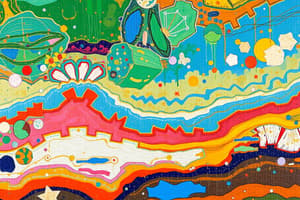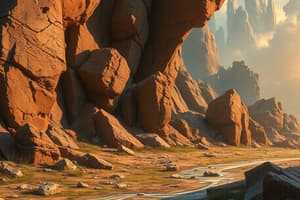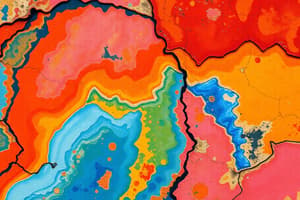Podcast
Questions and Answers
What impacts weathering on the land surface?
What impacts weathering on the land surface?
- Rain, frost, and temperature changes (correct)
- Volcanic eruptions and earthquakes
- Agricultural activities and mining
- Deforestation and urbanization
Which process involves the transportation of weathered materials by running water, moving ice, waves, and winds?
Which process involves the transportation of weathered materials by running water, moving ice, waves, and winds?
- Erosion (correct)
- Compaction
- Deposition
- Leaching
What are the three types of weathering mentioned in the text?
What are the three types of weathering mentioned in the text?
- Mechanical, electrical, and thermal weathering
- Physical, chemical, and biological weathering (correct)
- Psychological, emotional, and physical weathering
- Hydraulic, magnetic, and nuclear weathering
Which activity can help control floods according to the text?
Which activity can help control floods according to the text?
Which farming method can help in conserving soil according to the text?
Which farming method can help in conserving soil according to the text?
What are some elements that affect weathering in an area?
What are some elements that affect weathering in an area?
What is the major effect of weathering mentioned in the text?
What is the major effect of weathering mentioned in the text?
'Granular disintegration', 'exfoliation', and 'frost action' are associated with which type of weathering according to the text?
'Granular disintegration', 'exfoliation', and 'frost action' are associated with which type of weathering according to the text?
Flashcards are hidden until you start studying
Study Notes
Weathering Processes
- Weathering breaks down rocks through physical, chemical, and biological processes.
- Soluble minerals, such as rock salt, gypsum, and silica, dissolve in water, leading to rock fragmentation.
- Biological weathering involves plant and animal actions, where roots penetrate cracks and produce organic acids that further break down rocks.
Soil Profile
- Soil can be classified into layers: topsoil (Layer A), subsoil, parent rock, and underlying layers containing finer materials.
- Soil consists of mineral particles, moisture, living organisms (e.g., bacteria, earthworms), and organic matter, making it vital for food, shelter, and clothing.
- Soil formation is a gradual process taking thousands of years from the parent rock to develop a thin layer of soil.
Effects of Weathering
- Weathering contributes to landslides, where fragmented rocks slide down slopes.
- Continuous weathering generates soil by breaking rocks into tiny particles, essential for plant growth.
Soil Erosion
- Soil erosion involves the removal of the top layer of soil by wind, water, and human activities.
- Erosional processes can form features like gullies and affect agriculture negatively.
- Effective soil management practices, such as terrace farming, help mitigate erosion.
Human Activities Impacting Weathering
- Activities like mining, quarrying, deforestation, and road construction can accelerate weathering and alter soil cover.
- Urban development and agricultural practices can expose bare rock surfaces to weathering agents.
Experimental Soil Creation
- A simple experiment involves layering different materials (rock chunks, gravel, sand, organic matter) in a plastic bottle to simulate soil formation.
Factors Influencing Weathering
- Local climate, mineral composition, rock texture, vegetation cover, and human activity significantly affect weathering rates.
- Types of weathering include:
- Physical (granular disintegration, exfoliation, frost action)
- Chemical (oxidation, hydration, carbonation, solution)
Remembering Key Points
- Weathering is crucial as it shapes landforms, contributes to soil formation, and impacts ecosystems.
- Soil conservation techniques are necessary for sustainable land use and preventing degradation.
Studying That Suits You
Use AI to generate personalized quizzes and flashcards to suit your learning preferences.




